Eddie the Eagle: A Heartwarming Comedy About an Unlikely Olympian
“Eddie the Eagle” is a feel-good comedy that tells the story of Eddie Edwards, an outwardly awkward British man who defied the odds to compete in the 1988 Winter Olympics.
From a young age, Eddie Edwards (played by Taron Egerton) harbored a dream of Olympic glory. He tried his hand at various sports, enduring numerous injuries along the way, before discovering a passion for downhill skiing. As Eddie grew older, his skills improved to the point where he was on the cusp of joining the national team. However, Olympic officials deemed the goofy, chubby, and bespectacled Eddie, hailing from a working-class background, as not fitting the “high standards of British sport.” He was denied the opportunity to train for the Calgary Winter Games.
Undeterred, Eddie decided to master a new sport with less competition in Britain. He chose ski jumping, fully aware that it typically takes years to learn and carries a high risk of serious injury or even death upon a bad landing.
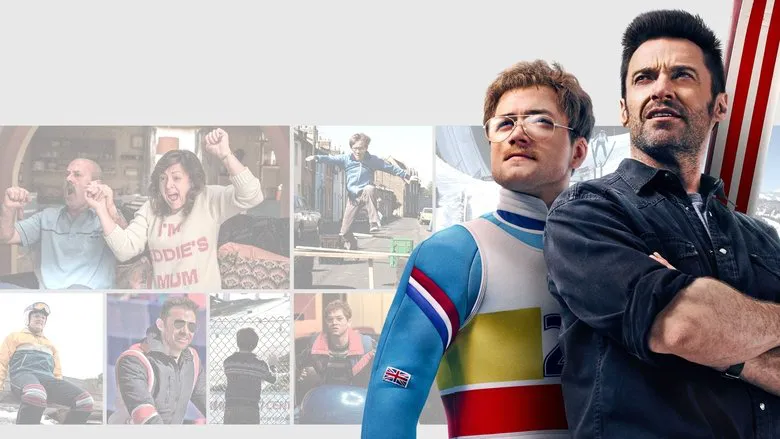
The Real Eddie
During his preparation for the Games, the real Eddie Edwards resided in a Finnish mental hospital. Not as a patient, but as a resident – a room in the hospital was more affordable than a hotel. Eddie trained in Finland because Britain lacked ski jumping facilities.
The Underdog Spirit
Britain has a soft spot for heroic underdogs. This is often attributed to the fact that many British victories are tainted by bloody imperial triumphs, making them difficult to celebrate. Heroic failures, on the other hand, are often morally pure. This is why the British revere figures like David Livingstone, the explorer who failed to find the source of the Nile, and Robert Scott, the Antarctic explorer who didn’t reach the South Pole first. And then there are the lesser-known but equally celebrated British “losers,” like ski jumper Eddie “The Eagle” Edwards, who finished last in his event at the 1988 Calgary Olympics.
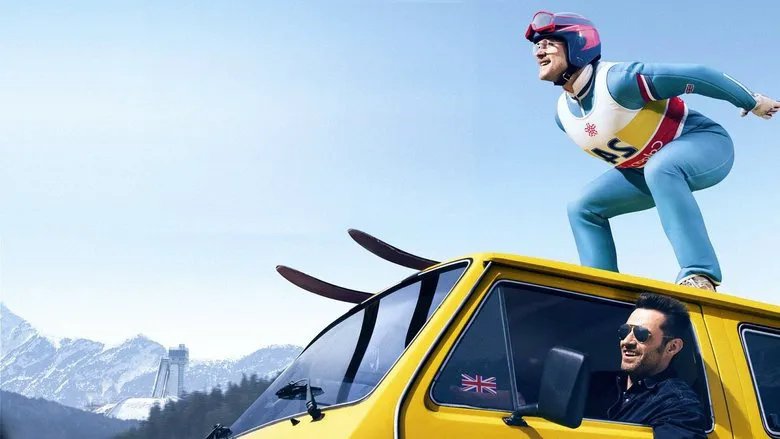
Taron Egerton’s Transformation
Taron Egerton spent his childhood in the Welsh village of Llanfairpwllgwyngyll, famous for its 58-letter name – the second-longest place name in the world after a hill in New Zealand with 85 letters. It’s often shortened to Taumata.
A National Hero
Eddie “The Eagle” was the best ski jumper in Britain (simply because no one else in the country took the sport seriously). He managed to land on his skis instead of his head (a feat in itself when jumping from a 90-meter hill), and he possessed unwavering determination. Only a true sporting hero could master a new discipline in a matter of months, lacking both natural talent and financial support. Eddie, a plasterer from the provinces, couldn’t even afford new equipment and had to wear six pairs of socks because his second-hand ski boots were the wrong size.
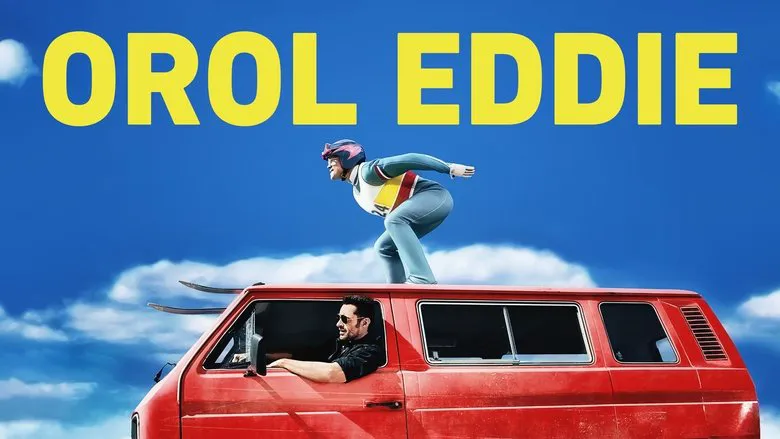
Defying Expectations
Eddie was a thorn in the side of the sporting establishment, and after his performance in Calgary, Olympic rules were tightened to prevent similar athletes from competing. However, the public admired Edwards, not only because he was a pure “heroic loser” but also because the bespectacled man with a thin mustache, crooked teeth, and shy smile looked like an ordinary Brit, not an unattainable sporting demigod.
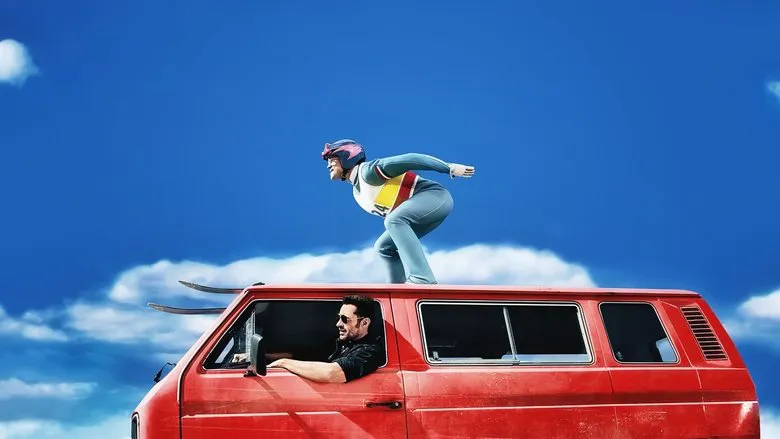
A Lasting Legacy
Eddie’s fame proved enduring. For years after Calgary, Edwards earned a living through advertising and television appearances. Now, his story has been immortalized in a film – a comedy, of course. Eddie’s journey to the bottom of the leaderboard was filled with absurd moments, and the athlete himself was a source of amusement. The film exaggerates this aspect, with Taron Egerton portraying Eddie as even funnier than the real “best British ski jumper.”
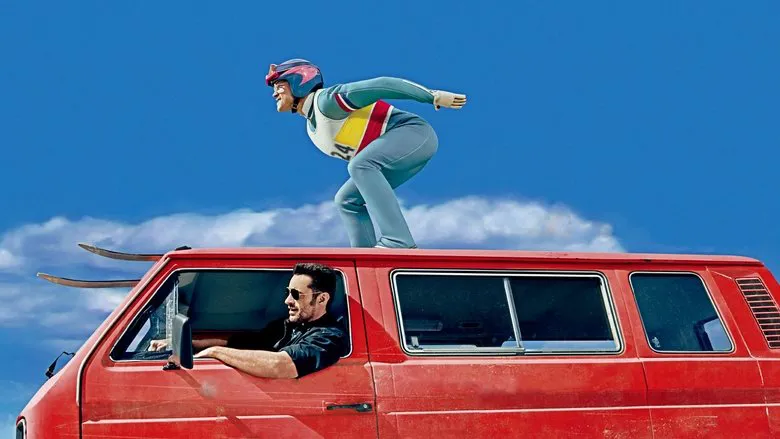
More Than Just a Comedy
Despite the abundance of jokes and gags, “Eddie the Eagle” doesn’t mock its hero; it celebrates him. The film vividly illustrates the dangers of ski jumping and constantly reminds us that a novice like Eddie should be taking baby steps, not risking his life to compete in the Olympics. But Edwards is stubborn and almost fearless (he only wavers in a couple of scenes). He repeatedly climbs the high jumps to fulfill his dream and shame those who laugh at him – both on screen (other athletes, Olympic officials) and in the audience. From childhood, Eddie behaves like a battering ram, smashing through every obstacle in his path to the Olympics, unafraid of injuries and fractures. The film is an inspiring tale of what can be achieved through sheer diligence.
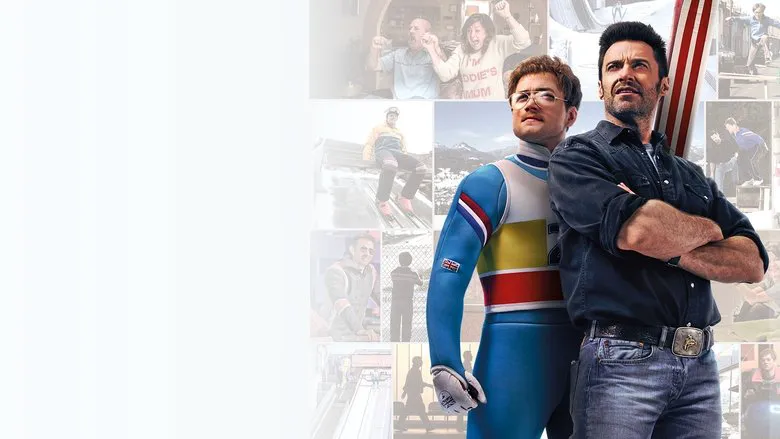
A Helping Hand
One of the temporary “stoppers” in Eddie’s path is Bronson Peary, a former American ski jumper who showed great promise but succumbed to alcoholism before becoming a champion. Unlike “The Eagle,” Hugh Jackman’s character, even after decades of drinking, still looks like a dashing athlete. Initially, he can’t believe Eddie is capable of anything. After all, Edwards is no match for him, a true contender! But when Peary realizes that Eddie would rather die than give up, he becomes his free coach. By the end of the film, the American is as invested in his protégé as Eddie’s mother, and his enthusiasm is contagious. Jackman and Egerton make a good comedic duo, with the former Wolverine relishing the opportunity to ignite the audience as a “drunken master” rather than a grim superhero.
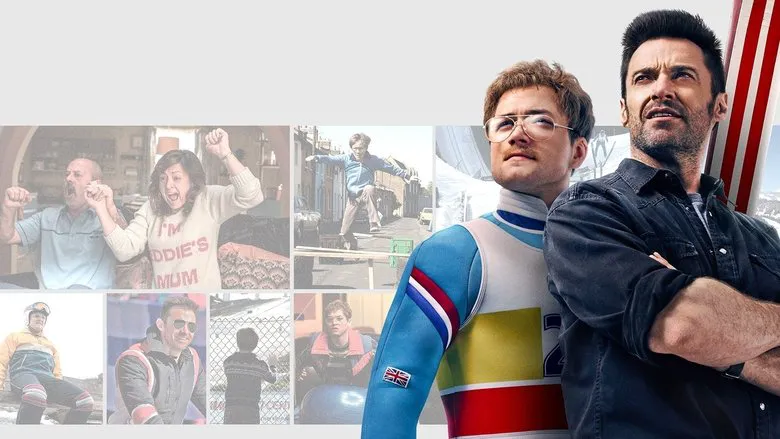
Egerton’s Versatility
Speaking of Egerton, Eddie is his second major role after Eggsy in “Kingsman: The Secret Service,” and the Welsh actor has transformed so radically that it’s hard to believe it’s the same guy we saw two years ago. Respect! Of course, much of this is thanks to the makeup and costume departments. But Eggsy and Eddie are completely different, not only in appearance but also in gestures, manner of speech, and even gaze. If Egerton continues to play such complex and vibrant roles, he could become a British superstar – a true actor, not just a memorable face on screen.
A Familiar Formula, Well Executed
Ultimately, “Eddie the Eagle” is a fairly standard comedic and inspirational sports movie. Comparing the script to Edwards’ real story reveals how often the film relies on templates and clichés borrowed from other movies rather than the hero’s life. Bronson Peary, for example, is a completely fictional character (in reality, Eddie had several temporary coaches and mostly trained on his own). But the clichés in the film are delivered with such force that they break through audience cynicism and entertain rather than irritate. Those who are immune to inspirational pathos can simply watch “Eddie the Eagle” as a fun movie about a quirky athlete. The only ones who will be disappointed are those who can’t stand movies without love stories. Eddie has a romance with the Olympics, not with a girl.